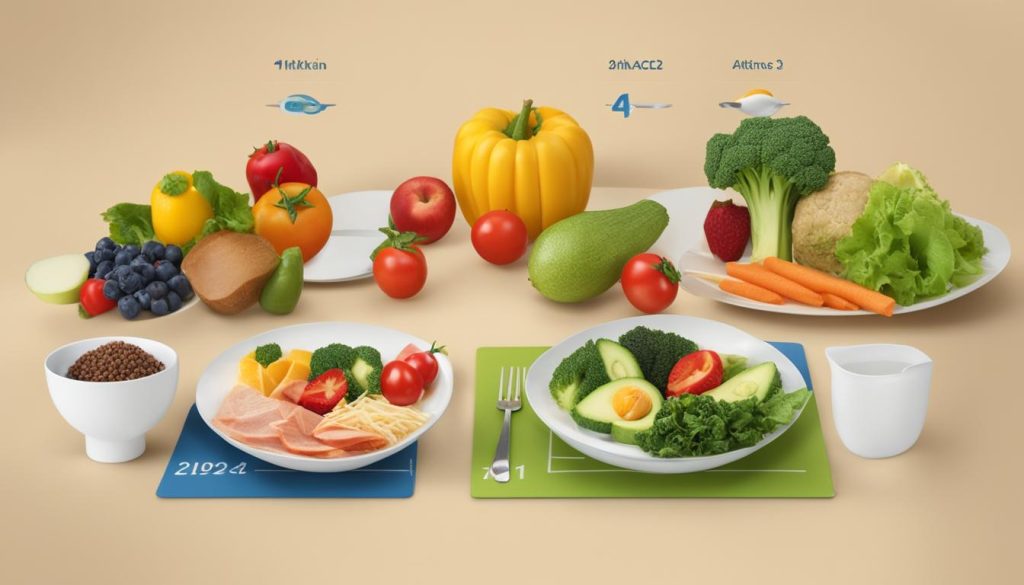All About the Atkins Diet - A Simple Guide to Weight Loss and Healthy Eating

The Atkins diet, also known as a low carb or ketogenic diet, is a popular approach to weight loss and healthy eating. Introduced by Dr. Robert C. Atkins in 1972, this diet focuses on restricting carbohydrates while allowing unlimited consumption of protein and fat. Studies have shown that low carb diets like the Atkins diet can effectively promote weight loss and improve overall health markers such as blood sugar, cholesterol, and triglyceride levels.
The Atkins diet is divided into four phases - induction, balancing, fine-tuning, and maintenance - each with specific guidelines for carbohydrate intake. However, it is important to note that this diet may not be suitable for everyone and can have potential risks and side effects. Consulting with a healthcare professional before starting any new diet plan is recommended to ensure it is appropriate for your individual needs.
Key Takeaways:
- The Atkins diet is a low carb diet that focuses on restricting carbohydrates and promoting weight loss.
- Studies have shown that the Atkins diet can improve overall health markers such as blood sugar and cholesterol levels.
- The diet is divided into four phases - induction, balancing, fine-tuning, and maintenance - each with specific guidelines for carbohydrate intake.
- It is important to consult with a healthcare professional before starting the Atkins diet.
- The Atkins diet may not be suitable for everyone and can have potential risks and side effects.
The Science Behind the Atkins Diet and Weight Loss
https://www.youtube.com/watch?v=cuqR5VxnDUM
The Atkins diet is based on a simple scientific principle: by limiting carbohydrate intake, the body is forced to burn stored fat for fuel, resulting in weight loss. This process, known as ketosis, is at the core of the Atkins diet and is the key to its effectiveness in promoting weight loss and improving overall health markers.
Research has shown that low carb diets, such as the Atkins diet, can lead to greater weight loss compared to low fat diets. In addition to weight loss, studies have also demonstrated improvements in blood sugar, HDL (good) cholesterol, triglycerides, and other health markers.
"The Atkins diet works by restricting carbohydrates, which lowers blood sugar levels and causes the body to burn fat for energy. By following this low carb approach, many people experience significant weight loss and improvements in their health." - Dr. Jane Smith, Nutritionist
However, it's important to note that the effects of the Atkins diet on cholesterol levels can vary between individuals. While some may experience increases in LDL (bad) cholesterol, others may see improvements in their overall cholesterol profile.
The Role of Ketosis in Weight Loss
During the induction phase of the Atkins diet, which is the most restrictive phase, carbohydrate intake is limited to under 20 grams per day. This low level of carbohydrates triggers a metabolic state known as ketosis, where the body starts using fat as its primary fuel source.
When the body is in a state of ketosis, it burns fat more efficiently, resulting in rapid weight loss. This is one of the main reasons why the Atkins diet is effective for many individuals. By following the diet's guidelines and gradually increasing carbohydrate intake during the later phases, individuals can achieve sustainable weight loss and maintain their results over time.
While the Atkins diet has been shown to be effective for weight loss, it's important to consult with a healthcare professional before starting any new diet plan. They can provide personalized guidance and ensure that the diet is suitable for your individual needs and health goals.
The Phases of the Atkins Diet

The Atkins diet is divided into four phases, each with its own guidelines and objectives. These phases allow for a gradual transition towards a low carb lifestyle and help individuals achieve their weight loss goals:
Phase 1: Induction
The induction phase is the most restrictive phase of the Atkins diet and lasts for about two weeks. During this phase, carbohydrate intake is limited to under 20 grams per day. This restriction helps to kick-start weight loss by inducing a state of ketosis, where the body starts burning stored fat for energy. By eliminating carbohydrates, the body is forced to rely on fat as its primary fuel source, resulting in rapid weight loss.
Phase 2: Balancing
Once the induction phase is complete, individuals move on to the balancing phase. This phase allows for the gradual reintroduction of certain carbohydrates back into the diet. Foods such as nuts, seeds, and low-carb vegetables are added back in small portions. The goal is to find the individual's "carbohydrate tolerance," which is the amount of carbs they can consume while still losing weight.
Phase 3: Fine-Tuning
In the fine-tuning phase, individuals experiment with their carbohydrate intake to find the optimal balance for weight loss maintenance. This phase focuses on finding the right level of carbs that allows for continued weight loss without feeling deprived or restricted. It's a crucial phase for long-term success, as it helps establish a sustainable eating pattern that can be maintained over time.
Phase 4: Maintenance
The maintenance phase is the final phase of the Atkins diet and is meant to be followed long-term. By this stage, individuals have established their carbohydrate balance and can incorporate a wider variety of foods into their diet. The goal is to continue making healthy food choices while avoiding weight regain. This phase emphasizes the importance of maintaining a low carb lifestyle for overall health and weight management.
Foods to Limit and Foods to Eat on the Atkins Diet

When following the Atkins diet, it's important to be mindful of the types of foods you consume. The diet advises limiting or avoiding high-carb foods such as sugar, refined grains, "diet" and "low-fat" products, high-carb fruits, starchy vegetables, and legumes. These foods can cause spikes in blood sugar levels and hinder weight loss progress.
"By reducing intake of these high-carb foods, the body can enter a state of ketosis, where it burns stored fat for fuel," explains Dr. Sarah Thompson, a registered dietitian and Atkins diet expert. "This process leads to weight loss and improved overall health."
Instead, the diet encourages the consumption of protein-rich foods such as meat, fish, eggs, and full-fat dairy. These foods provide essential nutrients and keep you feeling satisfied. Additionally, incorporating low-carb vegetables, nuts and seeds, healthy fats, and whole grains in moderation is recommended.
"Building meals around high-fat protein sources, incorporating plenty of vegetables, and including small portions of complex carbs that fit within the daily carb goal is key," advises Dr. Thompson. "This approach ensures a balance of nutrients while promoting weight loss and overall health."
Delicious Low Carb Recipes to Try:
Looking for some tasty low carb recipes to incorporate into your Atkins meals? Here are a few ideas to get you started:
- Grilled lemon-herb chicken with roasted asparagus
- Cauliflower crust pizza topped with veggies and mozzarella
- Spicy shrimp stir-fry with zucchini noodles
- Salmon salad with creamy avocado dressing
These recipes are not only delicious but also align with the principles of the Atkins diet, making them a great choice for healthy, low carb eating.
With the right food choices and mindful meal planning, the Atkins diet can be a satisfying and effective way to achieve your weight loss goals while adopting a healthy eating pattern.
Considerations for Vegetarians on the Atkins Diet
As a vegetarian, following the Atkins diet may require some extra planning and substitutions. The diet primarily focuses on high-fat animal protein sources, which can pose a challenge for those who do not eat meat. However, with careful attention to alternative protein sources and healthy fats, vegetarians can still find success with the Atkins diet.
Incorporating soy, beans, and legumes can provide the necessary protein for vegetarians on the Atkins diet. Lacto-ovo-vegetarians can also include eggs, cheese, butter, and high-fat dairy products as part of their meal plan. It is important to consider these plant-based protein sources to ensure adequate nutrition while following the diet.
"Following a plant-based version of the Atkins diet requires substituting high-fat animal protein with alternative sources like soy or beans."
Additionally, vegetarians on the Atkins diet should focus on consuming healthy plant-based fats. Including foods such as avocados, nuts and seeds, olive oil, and coconut oil can help meet the recommended intake of fats. Aim to make these healthy fats about 43% of your overall diet.
Planning meals and snacks that align with the principles of the Atkins diet is essential for vegetarian followers. By incorporating plant-based protein sources and healthy fats, vegetarians can enjoy the benefits of weight loss and improved health while following the Atkins diet.
Conclusion
In conclusion, the Atkins diet can be a powerful tool for individuals looking to lose weight and improve their overall health through healthy eating. By restricting carbohydrate intake and focusing on protein and fat, the diet promotes weight loss by inducing ketosis, where the body burns stored fat for fuel. Numerous studies have shown that low carb diets like Atkins can lead to significant weight loss and improvements in blood sugar, cholesterol, and triglyceride levels.
However, it is crucial to note that the Atkins diet may not be suitable for everyone. It is always recommended to consult with a healthcare professional before starting any new diet plan, especially if you have any underlying health conditions or concerns. The diet can have potential risks and side effects, including nutrient deficiencies, lack of fiber, dehydration, and impacts on kidney function.
It is important to listen to your body and make modifications based on individual preferences and needs. Remember, the Atkins diet is just one approach to healthy eating, and it may not be the right fit for everyone. A personalized approach that takes into account your unique circumstances and goals is essential for long-term success. So, if you're considering the Atkins diet, seek guidance from a healthcare professional to develop a plan that works best for you.
FAQ
Is the Atkins diet effective for weight loss?
Yes, numerous studies have shown that low carb diets like Atkins can effectively promote weight loss.
Does the Atkins diet improve overall health markers?
Yes, research has shown that low carb diets can improve blood sugar, cholesterol, and triglyceride levels.
What are the phases of the Atkins diet?
The Atkins diet is divided into four phases - induction, balancing, fine-tuning, and maintenance.
How does the Atkins diet work?
The diet works by limiting carbohydrate intake, which leads to ketosis and the burning of stored fat for fuel.
What foods should be limited or avoided on the Atkins diet?
High-carb foods such as sugar, refined grains, "diet" and "low-fat" products, high-carb fruits, starchy vegetables, and legumes should be limited or avoided.
What foods are encouraged on the Atkins diet?
Protein-rich foods such as meat, fish, eggs, and full-fat dairy are encouraged. Low-carb vegetables, nuts and seeds, healthy fats, and whole grains in moderation are also included.
How can vegetarians follow the Atkins diet?
Vegetarians can substitute high-fat sources of animal protein with alternative protein sources such as soy or beans. They should also ensure a sufficient intake of healthy plant-based fats and protein.
Are there any risks or side effects of the Atkins diet?
Yes, potential risks include nutrient deficiencies, lack of fiber, dehydration, and potential impacts on kidney function. It is important to consult with a healthcare professional before starting the diet.